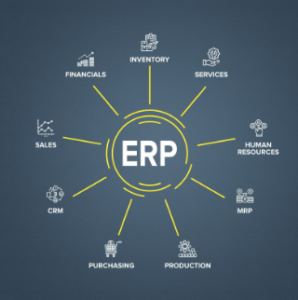Enterprise Resource Planning (ERP) systems are powerful tools that can help businesses streamline their operations, increase productivity and efficiency, and gain valuable insights into their performance. In this article, we will explore what an ERP system is, how it works, and how it can benefit you.
What Is An Enterprise Resource Planning (ERP) System?
An ERP system is a software application that manages and integrates a company’s core business processes, often in real-time, by using a common database and shared information. These processes include financial management, supply chain management, customer relationship management, human resources, inventory management, and more.
An ERP system provides a unified view of a company’s operations, which makes it easier to manage business processes and resources effectively. By automating many of the day-to-day tasks and processes, an ERP system can help businesses to streamline their operations, reduce errors, and increase efficiency.

ERP systems are designed to integrate all of a company’s business processes and functions into a single system. This means that data from all areas of the business, such as sales, marketing, production, and finance, are integrated into a central database that can be accessed by all authorized users.
An ERP system typically consists of several modules, each designed to manage a specific area of the business. For example, there may be modules for accounting, human resources, inventory management, and supply chain management. These modules can be customized to meet the specific needs of a business, so they can be as comprehensive or as specific as required.
Once implemented, an ERP system can automate many of the day-to-day tasks that are required to manage a business. For example, the system can automatically generate invoices, manage payroll and benefits, track inventory levels, and monitor sales orders. This automation reduces the need for manual input, which can reduce errors and save time.
What Are The Benefits Of An ERP System?
Implementing an ERP system can have a range of benefits for businesses across many different industries. Here are some of the most significant benefits:
- Improved Efficiency
One of the most significant benefits of an ERP system is that it can improve the efficiency of a business by automating many of the manual processes that are required to manage a company. By reducing the need for manual input, businesses can save time, reduce errors, and increase productivity.
- Increased Visibility
An ERP system provides a unified view of a company’s operations, which makes it easier to manage business processes and resources effectively. By having access to real-time data, businesses can quickly identify areas of inefficiency, track performance, and make informed decisions about the future.
- Enhanced Collaboration
An ERP system can enhance collaboration between different departments and teams within a business by providing access to real-time data that can be shared across different functions. This can help to improve communication, reduce duplication of effort,
Are you ready to get ahead of your data backlogs and streamline your business operations? Contact us now. Beginning the search for an ERP can be an incredibly overwhelming process. Let our experts help. We will review pain points in your existing business processes with you and make ERP recommendations accordingly. Our team are experts in implementing and augmenting ERP systems.


